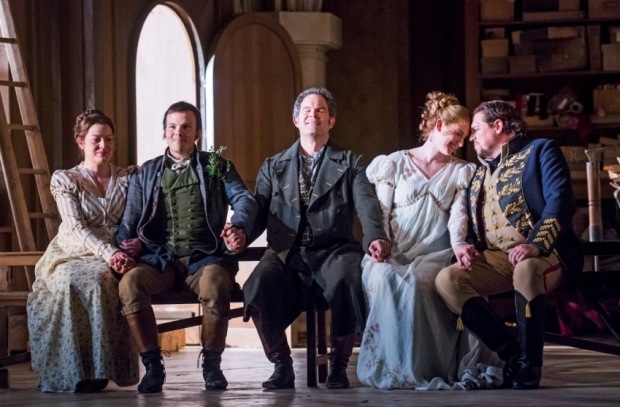Die Meistersinger von Nürnberg (Glyndebourne)

©Tristram Kenton
Illuminating in swathes but dim in patches, David McVicar‘s handsome production of Wagner’s sprawling comedy is revived five years on from its first appearance and opens the Glyndebourne Festival in epic style.
McVicar’s decision to update this medieval tale of merrie male songsters feels dramatically viable, particularly as his time machine stops at Wagner’s own era. However, the loopy values that allow old Pogner (a resonant Alastair Miles) to put his beloved daughter up as a competition prize might be acceptable at Muirfield but they sit awkwardly amid dinky 19th-century designs by Vicki Mortimer that are less Nuremberg than Hobbiton.
Wagner, who was not an instinctively funny man, posed a ticklish problem for directors when he set the brilliant second act after dark. The shade of night is deadly to comedy and careful lighting is needed to keep it alive. Here, the normally unerring Paule Constable‘s palette is excessively sombre, so the entertainment of the interrupted serenade and the climactic riot (the latter, alas, incoherently staged) is attenuated.
Conductor Michael Güttler, a late replacement for the indisposed Robin Ticciati, followed a careful overture with a finely detailed account of the opera itself. The soloists, Jeremy Bines's excellent Glyndebourne Chorus and a luminous London Philharmonic Orchestra responded superbly to his lead.
Glyndebourne’s eerie knack for good casting helped it win Festival of the Year at the recent International Opera Awards, but in one or two key roles the magic touch eludes it here. Amanda Majeski‘s airy soprano adequately fills Glyndebourne’s modestly-proportioned auditorium early on, but she struggled to project Eva's emotional weight in the third act and contributed a shrill edge to the ensemble in Hans Sachs’ house.
When all five voices blend as they should, that blissful quintet, "Selig, wie die Sonne", is the high point of the opera. Here, sadly, a second voice also fell short. Michael Schade, so distinguished in Schubert Lieder, seems wilful casting as the heroic Walther: it’s a heavily heroic part and the toll of singing across a long evening adds years to the Canadian tenor’s timbre.
"Endless legs and languid preening"
David Portillo, who is a first-rate Mozart singer, fares infinitely better as Sachs’s youthful apprentice, David, and forms an affecting partnership with Hanna Hipp‘s sweetly projected Magdalene.
A who’s who of British masters play the title roles, some so throwaway that I can’t even swear I heard them. Does Henry Waddington, last year’s magnificent Saul, here Hans Foltz, the coppersmith, actually get a solo line? Yet, in true McVicar style, they’re all meticulously defined and their every action is propelled by the music.
At the front end of this Meistersinger stand two lions. Jochen Kupfer is a fa-ah-bulously effete Sixtus Beckmesser, all endless legs and languid preening, a Malvolio to his newly-fitted shoes and far too good for the unfunny stage business McVicar concocts for him. (Comedy is not this protean director’s forte.) He is also blest with a dark-chocolate baritone that dignifies his character and invites us to pity him at his final humiliation.
Best of all is the human, humane, infinitely complex Hans Sachs of Gerald Finley. At the head of a company that’s light on heavy voices, he presents a man who combats inner pain in order to be a good citizen. It’s small wonder that Eva loves him.
Vocally, Finley is on rare, burnished form, and his gravitas even survives the discomfiting burst of chauvinism that closes Wagner's opera—where, ironically, Sachs sings his paean to ‘holy German art’ against a Toytown backdrop. Perhaps, after all, there’s more to Mortimer’s designs than meets the eye.
Die Meistersinger von Nürnberg continues in repertory at Glyndebourne until 27 June.










